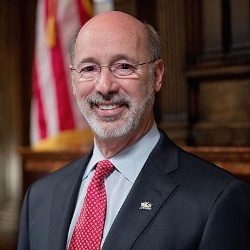Pennsylvania Internet Gambling in Limbo for Now

Pennsylvania’s online gambling proponents received a disappointing blow in mid-July when the state legislature recessed without passing an online gambling legalization bill. At the start of the month, lawmakers and online gambling advocates had been hopeful that July 2017 would be the month when the long-debated matter of iGaming legislation would be settled; however, it’s now clear that more waiting is in store.
Valuable Income Source
Governor Tom Wolfe (photo) has charged Pennsylvania lawmakers to come up with a revenue proposal that includes long-term sources of revenue rather than short-lived income sources. The majority of lawmakers agree that gambling is one of the best ways to provide long-term revenue for the state. Wolfe has signed off on proposals that include revenues from online gambling, online lottery sales, daily fantasy sports and the establishment of small satellite brick-and-mortar casinos located throughout the state. Yet, online gambling legislation has not yet been signed into law.
Contentious VLT Issue
By all reports, it isn’t online gambling that is causing the hold up with Pennsylvania’s gambling reform. Rather, lawmakers are arguing over whether or not video lottery terminals (VLT) should be included in the new bill. A faction of members of the Pennsylvania House is pushing for the terminals to be legalized and regulated; however, the Pennsylvania Senate has been firm in their contention that they will not pass a bill that includes VLTs. There is too much concern over how these terminals may contribute to gambling addiction, according to those familiar with Pennsylvania politics.
In mid-July, a version of the revenue bill that did not include video gambling terminals was then proposed. Everything seemed ready for a vote that would easily go through, but at the last minute, proponents of the terminals backed out, causing the entire debate to collapse.
Despite the delays, Harrisburg insiders seem confident that online gambling will happen this year in Pennsylvania. With no other viable sources of long-term revenue available to draw from, there is little choice but to pass a Bill in which everyone can agree with. Dave Reed, the Pennsylvania House Majority Leader, said as much in a statement, telling reporters that the legislation had to be done and would be done.
In hopes of appeasing lawmakers that are dragging their feet because of the video gambling terminal controversy, a new version of a bill that would require Harrisburg to renegotiate local taxes on gambling has been proposed. This clause would make it necessary for the entire topic of iGaming to be revisited in 2 years, giving those in favor of video gambling terminals the chance to argue their point and revise the laws.
Plugging the Budget Gap
Hopefully, this concession will pave the way for the online gambling bill to pass when the Pennsylvania House reconvenes. While July 2017 did not prove to be the long-awaited month for online gambling legislation, there is still a good chance that 2017 will finally see iGambling regulated in the Keystone State.
Having a $2.2 billion budget shortfall to plug is obviously adding further incentive for the state to plough ahead with its plan to expand gambling, and as the Associated Press (AP) explains:
“Failing to balance the budget could result in a freeze on some government spending, potentially affecting schools and counties that administer social service programs. Additionally, nearly $600 million in state aid to Penn State, the University of Pittsburgh, Temple and Lincoln universities and the University of Pennsylvania’s veterinary school remains in limbo.”
Current projections estimate that the industry could generate an additional $200 million in tax revenue. Nevertheless, the Senate last year decided to reject a previous bill approved in the House, and while allowing slot machines to be located in bars and airports across the state has apparently been shelved, online gambling continues to be one of the less contentious issues in question.
In the meantime, the Senate passed a tax bill on Thursday by a margin of 26-24, with the narrow vote highlighting the political divisions that exists between the Republicans and Democrats. These divisions are certain to be to manifested further when the bill is debated in the Republican controlled House, whose Republican House Speaker Mike Turzai would rather see revenues derived from a gambling expansion to cover the budgetary shortfall, rather than from an increase in taxes. The House is scheduled to return to session towards the end of August.









